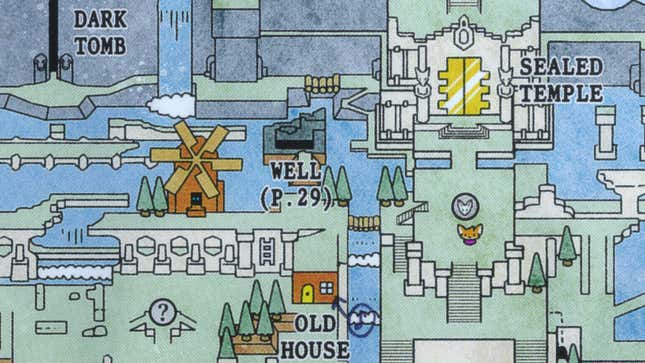
For a little game, Tunic musters an imposing presence. The isometric action-adventure romp, which casts you as a tiny fox with a big heart, is relentlessly difficult. It can be frustrating at first. But if you stick with it, you’ll find yourself playing one of the most striking games of the year.
I’ll be blunt. Tunic isn’t exactly the type of game that behooves advice. Slowly learning about all of its many quirks on your own is, one could argue, the entire point. But I’ve come to think of it along the lines of a puzzle game. Sometimes you need to look up the solution to a handful of early problems. Then, once you’ve got a handle on the basics, you have the tools to make it through the rest of the game. In that sense, Tunic is similar to stumpers like The Witness and Baba Is You: Instead of showing you the ropes, it gestures broadly in their direction, leaving you to grasp around in the shadows a bit until you find them. Here are Tunic’s ropes.
Find the sword ASAP
You start off Tunic with nothing more than a little stick. It is practically useless, offering so little in the way of protection that even low-level slime enemies can wipe you out. If you can survive a bit of exploration, though, you’ll find a sword in the Hero’s Grave region to the east. The sword is much, much more powerful than the measly stick, and can kill those pesky slimes in just a couple of hits. Once you get a sword, Tunic becomes eminently more playable.
The trick here is that you automatically retain any items you find—even if you die. They’ll be in your inventory once you respawn at the most recent not-tiny fox statue you’ve interacted with. For the sword, since there was absolutely no way I could fight my way through Hero’s Grave with just a stick, I sprinted past all of the enemies. (You can run by rolling and then continuing to hold down the roll button.) I picked up the sword, knowing I was surrounded and would get killed in the process. But when I came back to life, sword in hand, I went back through Hero’s Grave and made short work of all the slimes and other foes that made my life a temporary hell.
Then find the shield
After you find a sword, you’ll need a shield to complete your whole Zelda cosplay ensemble, particularly once you start running into Tunic’s absolutely maddening auto turrets. The shield is located in the Old House. (You can pinpoint the Old House’s exact location by opening the map, provided you’ve been collecting every sheet of Tunic’s delightful, ‘80s-inspired instruction manual.) Unfortunately, though, it’s not as simple as just waltzing in. The Old House, of course, is locked.
As a result, you can’t sprint your way to the shield, as you could with the sword. Instead, you’ll have to actually fight. There’s an envoy (a big soldier with a big soldier shield and a big soldier spear) down the stairs to the south. It’s standing on top of the key. You have two options: Defeat it, or lure it toward you, roll to the key, grab it, and run for your life.
Your ghost explodes
Dying in Tunic hurts, but not as bad as you think. You’ll lose some money; you won’t lose all of it. And like Hollow Knight, you can earn all of your lost coins back by making your way to where you last died and pressing A while standing next to the little blue apparition of the little fox. Better yet, interacting with your ghost will trigger a small explosion, stunning and dealing a small amount of damage to any nearby enemies. It’s not much, but if you use it at the right moment, it might be just enough to give you the edge over that pesky group of enemies that did you last time.
Go into the windmill
Inside the windmill, which is found in the central part of the Overworld, you’ll find what amounts to Tunic’s only shop, at least in the early goings. The potion (300 coins) is a permanent upgrade, and will increase the total number of potions you can carry. It’s a wise investment; like the Estus Flasks from Dark Souls, your potions replenish every time you save at a fox statue, so the more you have, the more times you can heal during a tough fight.
The restock of bombs (100 coins), however, is exhaustible; while helpful for crowd management in hectic fights, the purchase doesn’t increase your total carrying capacity or anything. Just a heads-up before you buy it. Without spoiling the discovery here—it’s one of the cool moments in the early game—you’ll want to hang onto at least some of those hard-earned coins.

Get lost
You’ll quickly find a map, which looks like a static rendition of a map from an NES-era instruction manual. Look close, and you’ll see a small fox icon on the map indicating your position. But it’s arguably more enjoyable to explore Tunic’s world without the guidelines.
Look behind every waterfall. (There’s always something behind the waterfall.) Scope out every hedge. (There’s often a gap that leads to some sort of secret pathway.) Look for sloped walls. (You can scale them to find even more secret pathways.) Tunic is one of those games that doesn’t have a pixel out of place. If it seems like you’re lost, you’re not. Like everything else about this sometimes-maddening, always-rewarding gem of a game, you just need a bit of patience.





